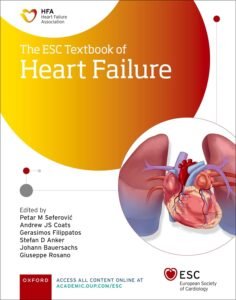
Outline of the Article:
- Introduction to the ESC Textbook of Heart Failure
- Overview of the ESC publication
- Importance in the field of cardiology
- Authors and Background
- Prof Petar Seferovic, Prof Andrew Coats, Prof Gerasimos Filippatos, and others
- Their contributions and expertise in cardiology
- European Society of Cardiology Series
- Overview of the ESC series
- Significance and scope of the series
- Features and Guarantee of the Textbook
- Pre-order Price Guarantee
- Support from the European Heart Failure Association
- Comprehensive Coverage of Heart Failure
- Sections and aspects covered in the textbook
- Focus on epidemiology, etiology, prevention, pathophysiology, and clinical phenotypes
- Assessment and Management of Heart Failure
- Detailed discussion on chronic, acute, and advanced heart failure
- Emphasis on self-care, patient education, and multidisciplinary management
- Incorporation of Latest Clinical Evidence
- Summarizing contemporary European guidelines
- Evidence-based insights from clinical trials
- Future Direction and Technological Integration
- Discussion on digital health, big data, telemedicine in heart failure
- Implications and advancements in the field
Exploring the ESC Textbook of Heart Failure: A Comprehensive Review
The ESC Textbook of Heart Failure marks a significant addition to the European Society of Cardiology (ESC) publications, offering an extensive understanding of heart failure, a chronic condition affecting millions worldwide.
Introduction to the ESC Textbook of Heart Failure
This textbook, authored by Prof Petar Seferovic, Prof Andrew Coats, Prof Gerasimos Filippatos, and other eminent experts, stands as a cornerstone in the field of cardiology. It addresses various aspects of heart failure, aiming to update healthcare specialists and aid those in training.
Authors and Background
The distinguished authors bring a wealth of expertise to this publication. Prof Petar Seferovic, Prof Andrew Coats, and Prof Gerasimos Filippatos, along with other contributors, are highly regarded in cardiology, lending credibility and depth to this comprehensive work.
European Society of Cardiology Series
Part of the ESC series, this textbook maintains the series’ reputation for delivering high-quality, clinically relevant content. Its integration with the European Heart Failure Association emphasizes its authoritative status in the realm of heart failure.
Features and Guarantee of the Textbook
The pre-order price guarantee and endorsement by the European Heart Failure Association reinforce the textbook’s value, assuring readers of its quality and relevance in cardiovascular healthcare.
Comprehensive Coverage of Heart Failure
The textbook comprises eighteen sections, encompassing diverse aspects of heart failure, including epidemiology, etiology, prevention, pathophysiology, clinical phenotypes, and management strategies.
Assessment and Management of Heart Failure
From chronic to advanced stages, the textbook delves into assessing and managing heart failure comprehensively. Chapters on self-care, patient education, and a multidisciplinary approach provide a holistic view for healthcare practitioners.
Incorporation of Latest Clinical Evidence
Aligning with contemporary European guidelines and incorporating insights from clinical trials ensures that readers receive the most recent evidence-based knowledge and guidelines in heart failure management.
Future Direction and Technological Integration
The textbook discusses emerging trends in the field, such as digital health, big data, and telemedicine, providing insights into the future landscape and advancements in heart failure management.
Conclusion
The ESC Textbook of Heart Failure emerges as a fundamental resource for cardiovascular healthcare specialists, offering a thorough understanding of heart failure management. With contributions from leading experts and a focus on evidence-based practices, it stands as a vital guide for practitioners, trainees, and healthcare professionals worldwide.
Unique FAQs:
- How does the ESC Textbook of Heart Failure stand out among other publications in the field of cardiology?
- What specific aspects of heart failure management are covered extensively in this textbook?
- Are there additional benefits or guarantees for readers considering pre-ordering this textbook?
- What sets apart the authors of this textbook in terms of their contributions to cardiology?
- How does this textbook address the future of heart failure management, incorporating technological advancements?







